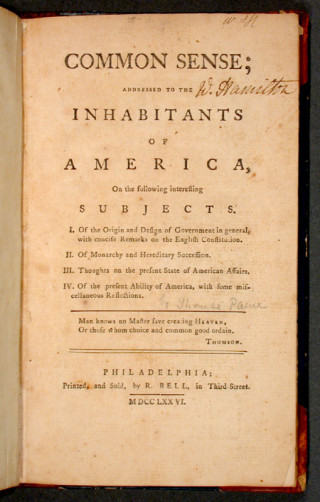Common Sense was the most widely read pamphlet of its time, and it was made to be. Just as significant as the pamphlet’s argument was its sense of an audience. As Jill Lepore put it: “Paine wrote like no one else: he wrote for everyone.” Writing for everyone, the way Paine does it, means a lot more than favoring short sentences and firework-like imagery; it means treating his readers as equals partners in the making of the future. Underlying every syllable of Paine’s polemic is a deeply rooted belief that you, Reader, whoever you are, whatever you do, matter enormously to the fate of the colonies and the world, that what you choose to think will in large measure decide what becomes of life as we know it.
A mere cynic would use this language to get people drunk on power; but Paine believed every word, and he saw himself sobering people up to the reality they faced. That included people with less education than himself. He must have known the writings of political theorists like Hobbes and Locke, but he was singularly unconcerned with whether his readers knew them, or knew that he knew. Paine wrote for common audiences to build a common cause. For him, the word “common” was never pejorative.
At its core, Common Sense makes a truly revolutionary argument about every generation’s relationship to time, tradition, and history. With examples drawn from Scripture and across the length of history, Paine commits rhetorical regicide. His target is not one king, but all of them. When we trace any royal line back to its progenitor, he argues, that first king always turns out to be a swaggering thug, a bully whom no one in their right mind would follow. Resigning oneself to life under such a person’s authority would be bad enough, but hereditary monarchy makes things infinitely worse: the generation that crowns him also sacrifices their descendants to his, trading away the freedoms of numberless future generations long before they are even born. For people who would do such a thing, Paine’s contempt has no bottom.
But how are free people supposed to stay free? One short answer: don’t trust anyone over thirty. Paine, reversing centuries’ worth of regard for age and experience, argued that freedom is not a privilege that the old may confer, but a right that the young must demand. Every rising generation should hold its predecessors accountable, boldly taking its rights from them and leaving the rest of their property—superstitions, prejudices, structures of power—to decay with them in the grave.
